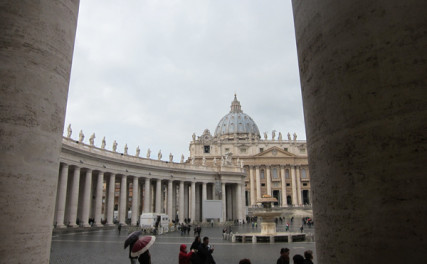
VATICAN CITY (RNS) The conclave to pick a new pope will begin on Tuesday (March 12) the Vatican said Friday, resolving an open question that had dogged the cardinals meeting here over the past week.
The cardinals will celebrate a special Mass “pro eligendo Romano Pontifice” — for the election of the Roman Pontiff — in St. Peter’s Basilica on Tuesday morning, and in the afternoon the cardinals will enter into the Conclave, the Vatican said.
The date was set by the cardinals gathered in a late-afternoon session on Friday. They were scheduled to vote on the decision, but there was no word on how many supported the Tuesday start date or how many preferred an earlier or a later date.
In one of his last acts before resigning on Feb. 28, Pope Benedict XVI amended the law regulating papal elections to allow cardinals to move up the beginning of the conclave, which would normally not be able to start until at least 15 days after a pope dies or leaves office.
Because Benedict resigned — the first pope to do so in 600 years — and announced his plans on Feb. 11, the cardinals did not have to focus on a funeral, as they did when John Paul II died in April 2005. They also have had nearly a month to think about a successor.
As a result, many believed the cardinals did not need to wait long after Benedict’s resignation took effect to begin the conclave itself.
But the start date was one of several issues reportedly dividing the cardinals as they gathered in closed-door daily meetings over the past week to prepare for the papal election.
Some of the cardinals — notably the American electors and several from Africa and Latin America — had balked at trying to hold the conclave too quickly, arguing that the more than 150 cardinals gathered here needed time in their General Congregation meetings to discuss the key issues facing the church and to size up potential candidates.
Other cardinals, notably those associated with the Roman Curia (the Vatican bureaucracy) were pushing for a quick conclave, apparently in hopes of choosing a candidate to their liking before the cardinals from other parts of the world could rally around an outsider.
The Tuesday start date appears to be a compromise, albeit one that favors those who were seeking more time to evaluate the candidates and the state of the Roman Catholic Church.
There are 115 cardinals who were under 80 when Benedict XVI resigned and are therefore eligible to vote for his successor. With a supermajority of two-thirds required for an election, a cardinal will need 77 votes to become the next pope.
Over the past century, conclaves have averaged just three days, with recent conclaves going no more than a day or two. But the field appears to be more open than in past elections, and no one is sure how long the coming conclave could last. Church experts say it is not likely to run more than three or four days at most, however.
Under the conclave rules, there are two ballots in the morning and two in the afternoon, until a pope is elected. The ballots are burned after each round, and chemicals are added after the victory round to make the smoke white to signal a successful conclusion to the voting.
According to the Vatican’s chief spokesman, the Rev. Federico Lombardi, around 100 cardinals have taken the floor to deliver five-minute speeches during the daily pre-conclave meetings that began on Monday.
The cardinals have touched on a variety of topics, ranging from relations between the Vatican and bishops around the world to issues such as interfaith dialogue and bioethics.
Vatican secrecy rules forbid the disclosure of the identity and contents of cardinals’ addresses during the meetings, but Lombardi said that at least one of Friday’s talks centered on “the importance of a positive presentation of Christianity — a presentation that focuses on love, joy, and mercy.”
Lombardi stressed that these pre-conclave meetings are just part of the process of reflection before the cardinals enter the Sistine Chapel to vote. Assessing a papal candidate also takes place “through personal contacts and reflection,” Lombardi said, referring to the informal chats that cardinals during coffee breaks and over private dinners.






